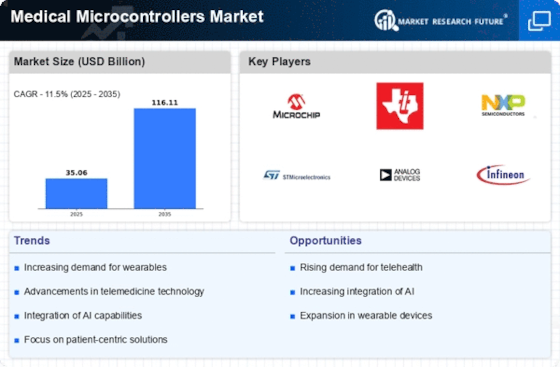Top Industry Leaders in the Medical Microcontrollers Market

The Competitive Landscape of the Medical Microcontrollers Market
Within the intricate symphony of modern healthcare, where medical devices whisper their diagnostic stories, medical microcontrollers act as the silent conductors, orchestrating functions, processing data, and ensuring patient safety. This dynamic market pulsates with innovation, fierce competition, and the promise of revolutionizing healthcare with efficiency, precision, and improved patient outcomes. Navigating this complex space requires discerning the strategies of key players, understanding market share nuances, and recognizing the emerging trends shaping its future rhythm.
Key Players:
- NXP Semiconductors
- Renesas Electronics
- Microchip Technology
- Infineon Technologies
- STMicroelectronics
- Texas Instruments
- Cypress Semiconductors
- Silicon Laboratories
- ToshibaSanofi Aventis
- Biogen Idec Inc
- PTS Diagnostics
- Sekisui Diagnostics
- Thermo Fisher Scientific
- bioMérieux S.A.
Strategies Adopted by Leaders:
- Technological Prowess: Renesas Electronics and NXP Semiconductors lead the charge with expertise in low-power consumption, high reliability, and compliance with stringent medical device regulations, catering to demanding applications like pacemakers and implantable pumps.
- Vertical Specialization: Texas Instruments focuses on microcontrollers for portable medical devices like glucose monitors and blood pressure cuffs, while Microchip Technology targets high-performance controllers for diagnostic equipment like MRI machines and ultrasound scanners.
- Partnership Play: STMicroelectronics collaborates with medical device manufacturers and research institutions, fostering co-development of integrated solutions and accelerated innovation.
- Open-Source Initiatives and Knowledge Sharing: The IEEE Engineering in Medicine and Biology Society promotes standardization and best practices in medical microcontroller design, lowering entry barriers for smaller players.
- Focus on Security and Data Protection: Implementing robust security features and encryption protocols safeguards patient data and ensures compliance with healthcare regulations.
Factors for Market Share Analysis:
- Performance and Reliability: Companies offering microcontrollers with precise timing, minimal latency, and extended lifespans command premium prices and secure market share by enabling accurate and reliable medical device operation.
- Power Efficiency and Compactness: Providing low-power microcontrollers suitable for battery-powered devices extends operating times and caters to portable applications, expanding market reach.
- Compliance and Regulatory Expertise: Navigating stringent medical device regulations and demonstrating compliance with safety standards like IEC 62366 is crucial for market entry and customer trust.
- Software Development Tools and Support: Offering user-friendly development tools, comprehensive technical support, and reference designs accelerates device development and simplifies integration for manufacturers.
- Focus on Interconnectivity and Data Acquisition: Providing microcontrollers with built-in communication interfaces and data acquisition capabilities allows for seamless integration with medical sensors and facilitates remote patient monitoring.
New and Emerging Companies:
- Startups like Arteris Inc. and Cardiovate Inc.: These innovators focus on developing AI-powered medical microcontrollers capable of real-time data analysis and advanced signal processing, enabling intelligent medical devices with predictive capabilities.
- Academia and Research Labs: MIT's Center for Biomedical Engineering and Stanford University's Biodesign Program explore next-generation medical microcontroller architectures and biocompatible materials, shaping the future of the market.
- Material Science Innovations: Companies like Dow Chemical and Evonik develop advanced biocompatible materials for chip packaging and electrodes, enhancing safety and functionality of medical devices.
Industry Developments:
NXP Semiconductors:
- October 2023: Launched the i.MX RT1170 MCU, designed for wearables and portable medical devices with low power consumption and advanced security features.
- June 2023: Announced collaboration with BioTelemetry to develop next-generation remote patient monitoring solutions using NXP's Kinetis K32W04 MCUs for low-power wireless connectivity.
Renesas Electronics:
- November 2023: Introduced the RA2A1S 32-bit ARM Cortex-M0+ MCU with built-in analog front-end for glucose meters and other point-of-care devices.
- September 2023: Announced availability of the RX671 microcontrollers featuring high-precision ADCs and low-power consumption for medical imaging and diagnostic equipment.









